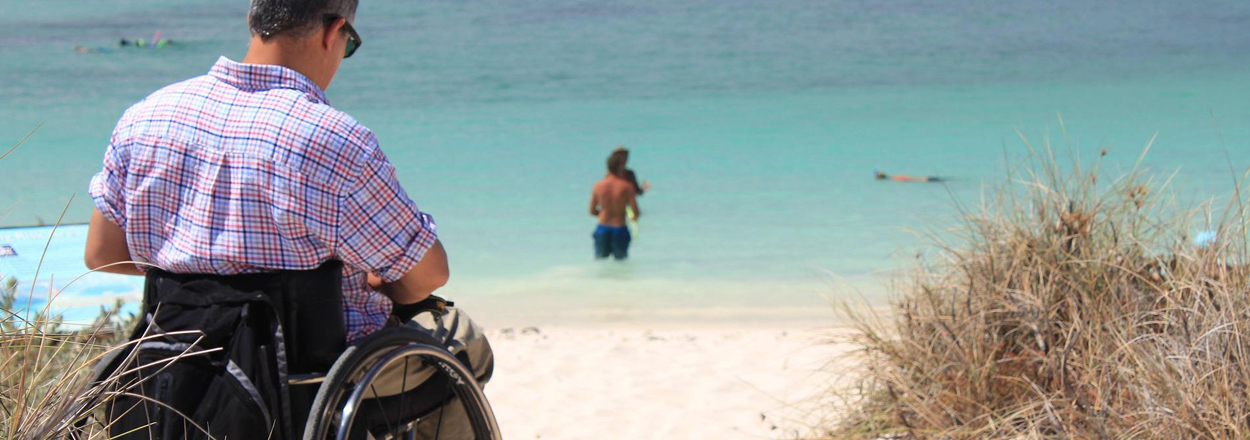
Travel Insights from Codie Liermann, managing editor of The Compass
Understanding the Needs and Concerns of Travelers With Disabilities
As a travel advisor, one of your goals is to create seamless experiences for your clients. From the start of the planning process to the arrival back home after the trip, you want your travelers’ vacations to be effortless – especially since the point of vacation for most people is relaxation.
Lately it seems we’ve seen obstacles stand in the way for almost every traveler, from flight cancellations and extensive entry requirements to overpriced accommodations and canceled tours. Booking a vacation these days is no easy task.
According to a report released by MMGY Global earlier this month, Portrait of Travelers with Disabilities: Mobility & Accessibility, there are even more barriers for travelers with mobility issues. Companies within the travel industry don’t always have travelers with mobility aids in mind, and this recent study was put together to create awareness around the needs and concerns of travelers with disabilities and help make travel more inclusive for everyone.
After hearing from more than 2,700 Americans with mobility disabilities as well as their companions, the survey highlighted several alarming challenges this group of travelers is facing. In regard to transportation, four in 10 travelers have had mobility aids lost or damaged by an airline, and six in 10 experienced wait times for mobility assistance before or after a flight. When it comes to accommodations, 54 percent checked in to a room that didn’t match the type of room they booked, and 81 percent have had to deal with inaccessible showers or tubs. And this is just the tip of the iceberg.

It’s not all bad news though – Lisa Zwissler, a travel advisor with Beach Bum Vacation, explained she’s noticed an increased awareness of accessible travel over the years but that there is still room for growth. “I have noticed a difference though I still think there is a lot of room for improvement,” she said. “More hotels are offering the beach wheelchairs and pool chairs. Hotels are doing a better job of keeping paths well lit, having ramps and having restaurants throughout the hotel and not always in a concentrated area.”
There are also several tour companies dedicated to accessibility and wheelchair-accessible resorts for advisors to keep top of mind. Travel agents can make a big difference when it comes to working with travelers with disabilities and have the opportunity to create successful trips for those facing more obstacles.
Lynn Clark, a travel advisor affiliated with Travel Leaders, pointed out that when agents are serving travelers with disabilities, it’s important to learn the specific needs of their clients and remember that not all disabilities fall under the same umbrella. “Just like a reporter, you have to ask really good questions and then, of course, listen to what your clients are saying,” she said. “You have to understand the impact of the person’s disability to be able to help them.”

Travelers with mobility disabilities (currently spending $58.2 billion per year on travel) should be able to enjoy all the same experiences travelers without disabilities enjoy, and MMGY Global aims to make this a priority across the industry. The full Portrait of Travelers with Disabilities: Mobility & Accessibility report can be accessed here, and all proceeds from the report sales are donated to the United Spinal Association.
“United Spinal is grateful for the work of MMGY Global in raising awareness on the accessibility needs of travelers with mobility disabilities,” said Vincenzo Piscopo, United Spinal’s President and CEO. “As a wheelchair user, I know firsthand the barriers our community must overcome when traveling, including damage to mobility equipment at the airport to encountering unexpected accessibility issues at hotels and other venues. Identifying these issues is critical to ensuring travel is accessible to all.”
About the Author

You May Also Like
Accessible Travel: An Interview with Lisa Zwissler
The need for accessibility in travel, and in life in general, is great and isn’t openly discussed often enough. If you’d like to learn more about the challenges faced by so many people today, I would highly recommend Disability Visibility: First-Person Stories from the Twenty-First Century. I
Adaptive Adventures: Accessibility on the Slopes
Dating back to 1942, accessible skiing got its start when Paul Leimkuehler, a WWII vet and below-knee amputee, invented the outrigger adaptive ski from a pair of sawed-off crutches. Since then, adaptive ski (and even snowboarding) equipment has come leaps and bounds giving differently-abled traveler
11 Certified Autism Centers Around the U.S.
Saying your business is “autism friendly” isn’t enough anymore. To truly create an inclusive experience for visitors with autism or other sensory needs, destinations, theme parks and attractions are turning to the experts at the International Board of Credentialing and Continuing Education Standards
5 Tour Companies That are Dedicated to Accessibility
From lodging and transportation to excursions and activities, there are a lot of elements to consider when booking a vacation. However, something that isn’t often talked about is the uncertainty that travelers with disabilities can face during the planning process. Will the accommodations be ADA-com